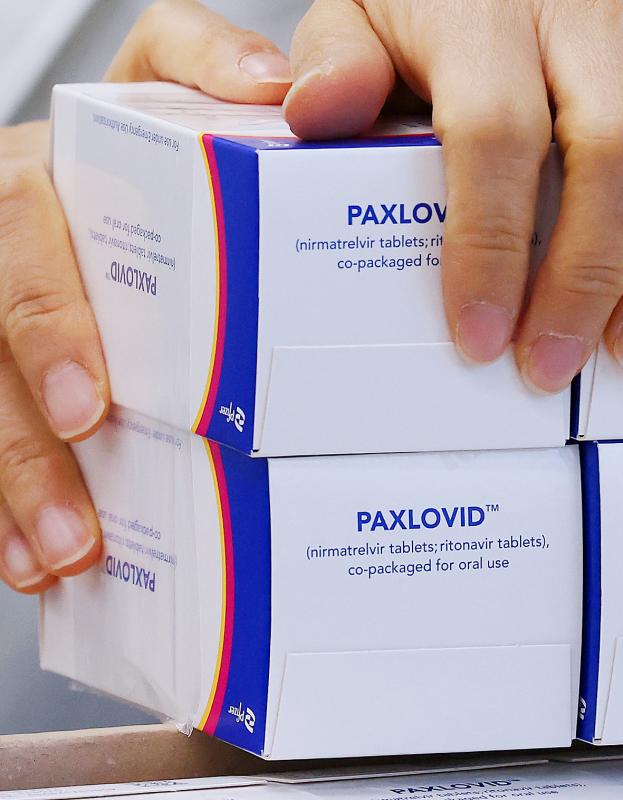The Food and Drug Administration (FDA) yesterday issued a special import permit for Paxlovid, an oral antiviral drug developed by Pfizer Inc to treat COVID-19, and the first shipment is expected to arrive before March, the Central Epidemic Command Center (CECC) said.
Pfizer’s import permit application was approved after a specialists’ meeting at the agency yesterday morning, FDA Director Wu Shou-mei (吳秀梅) said.
Having assessed Paxlovid’s therapeutic effect, safety, risks and benefits, and considering the domestic COVID-19 situation and public health demand, the specialists agreed to grant special approval to the drug, according to Article 48-2 of the Pharmaceutical Affairs Act (藥事法), she said.

Photo: Reuters
Pfizer is required to implement a risk management plan during the special permit period to ensure the drug’s safety, she added.
Paxlovid should be administered after a diagnosis of COVID-19 and within five days of the onset of symptoms, for adults who are at high of risk developing severe illness from the virus and children aged 12 or older weighing at least 40kg with mild to moderate symptoms, she said.
The drug is administered as three tablets — two tablets of PF-07321332 (150mg) and one tablet of ritonavir (100mg) — which are packaged together to take orally twice daily for a five-day course, Wu said, adding that not following the course could affect the treatment.
PF-07321332 works by blocking the activity of an enzyme that SARS-CoV-2 needs to multiply, and ritonavir helps slow the metabolism of PF-07321332, allowing it to remain active at higher concentrations in the blood for extended periods, she said.
Minister of Health and Welfare Chen Shih-chung (陳時中), who heads the CECC, said that the ministry has signed a procurement contract with Pfizer to purchase 20,000 courses of Paxlovid, and that the first batch is expected to arrive before March.
Paxlovid is the second oral antiviral COVID-19 medication to obtain a special import permit from the FDA, after the CECC on Wednesday said that a permit was issued to US drugmaker Merck’s Taiwan branch for its molnupiravir antiviral drug.

The US government has signed defense cooperation agreements with Japan and the Philippines to boost the deterrence capabilities of countries in the first island chain, a report by the National Security Bureau (NSB) showed. The main countries on the first island chain include the two nations and Taiwan. The bureau is to present the report at a meeting of the legislature’s Foreign Affairs and National Defense Committee tomorrow. The US military has deployed Typhon missile systems to Japan’s Yamaguchi Prefecture and Zambales province in the Philippines during their joint military exercises. It has also installed NMESIS anti-ship systems in Japan’s Okinawa

TRAGEDY STRIKES TAIPEI: The suspect died after falling off a building after he threw smoke grenades into Taipei Main Station and went on a killing spree in Zhongshan A 27-year-old suspect allegedly threw smoke grenades in Taipei Main Station and then proceeded to Zhongshan MRT Station in a random killing spree that resulted in the death of the suspect and two other civilians, and seven injured, including one in critical condition, as of press time last night. The suspect, identified as a man surnamed Chang Wen (張文), allegedly began the attack at Taipei Main Station, the Taipei Fire Department said, adding that it received a report at 5:24pm that smoke grenades had been thrown in the station. One man in his 50s was rushed to hospital after a cardiac arrest

ON ALERT: Taiwan’s partners would issue warnings if China attempted to use Interpol to target Taiwanese, and the global body has mechanisms to prevent it, an official said China has stationed two to four people specializing in Taiwan affairs at its embassies in several democratic countries to monitor and harass Taiwanese, actions that the host nations would not tolerate, National Security Bureau (NSB) Director-General Tsai Ming-yen (蔡明彥) said yesterday. Tsai made the comments at a meeting of the legislature’s Foreign Affairs and National Defense Committee, which asked him and Minister of National Defense Wellington Koo (顧立雄) to report on potential conflicts in the Taiwan Strait and military preparedness. Democratic Progressive Party (DPP) Legislator Michelle Lin (林楚茵) expressed concern that Beijing has posted personnel from China’s Taiwan Affairs Office to its

PUBLIC SAFETY: The premier said that security would be tightened in transport hubs, while President Lai commended the public for their bravery The government is to deploy more police, including rapid response units, in crowded public areas to ensure a swift response to any threats, President William Lai (賴清德) said yesterday after a knife attack killed three people and injured 11 in Taipei the previous day. Lai made the remarks following a briefing by the National Police Agency on the progress of the investigation, saying that the attack underscored the importance of cooperation in public security between the central and local governments. The attack unfolded in the early evening on Friday around Taipei Main Station’s M7 exit and later near the Taipei MRT’s Zhongshan